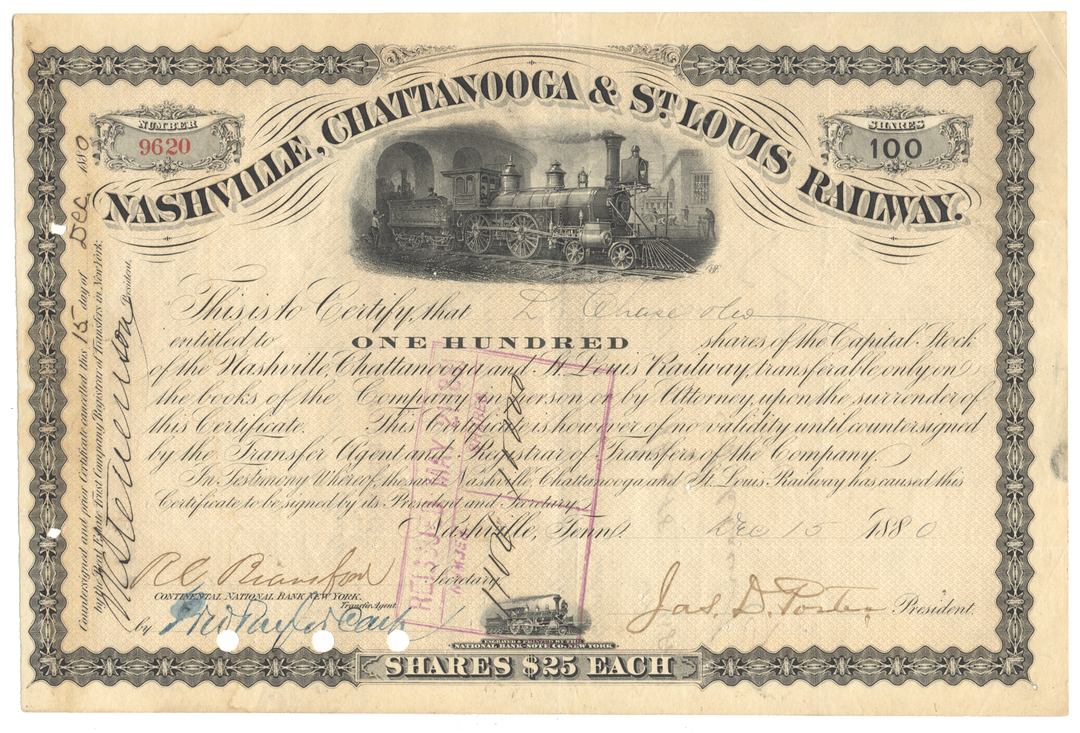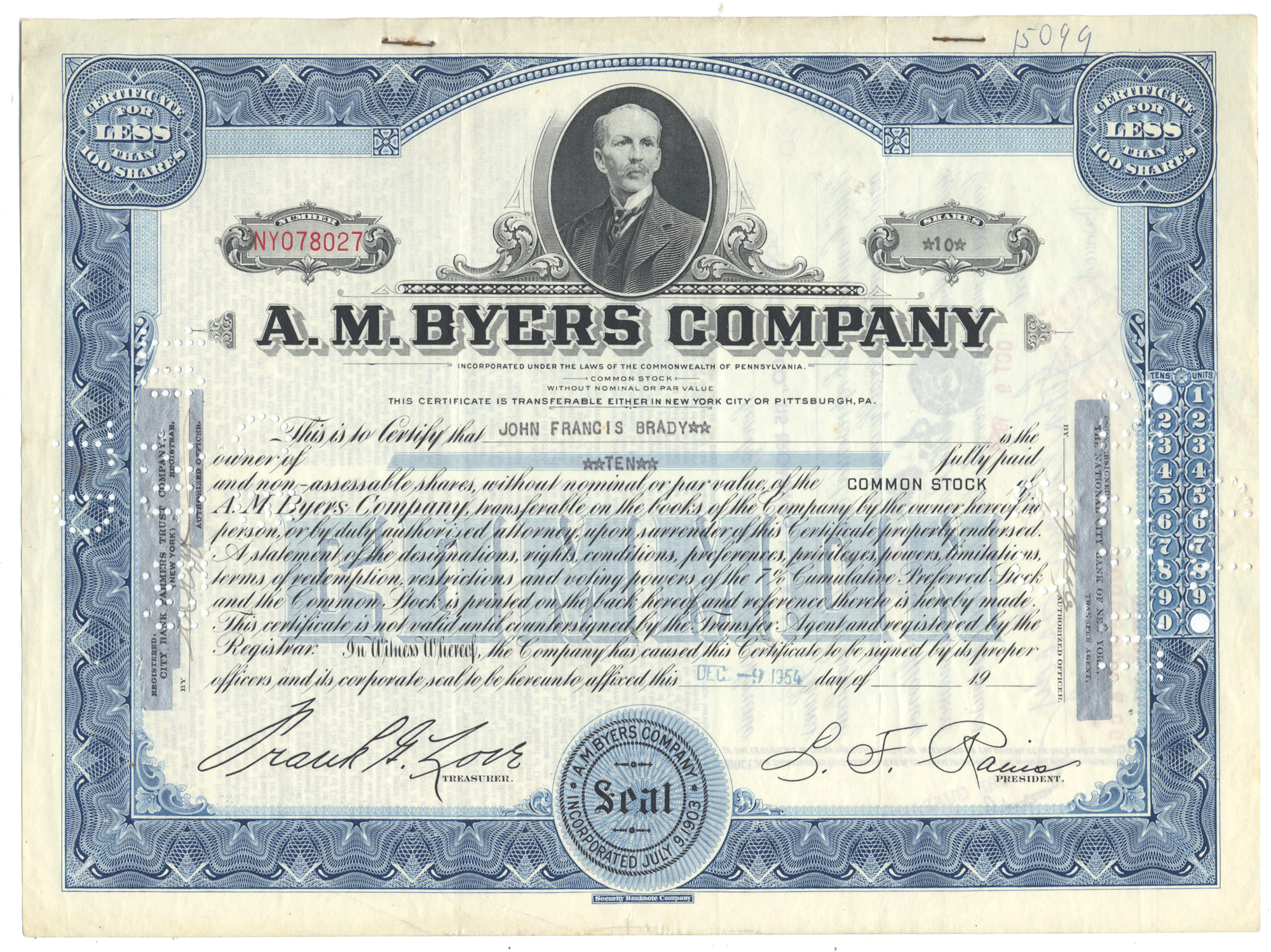
Nashville, Chattanooga & St. Louis Railway Company (Signed by James Davis Porter)
- Guaranteed authentic document
- Orders over $75 ship FREE to U. S. addresses
Product Details
| Company | Nashville, Chattanooga & St. Louis Railway Company |
| Certificate Type | Capital Stock |
| Date Issued | December 15, 1880 |
| Canceled | Yes |
| Printer | National Bank Note Company |
| Signatures | Hand signed |
| Approximate Size |
11" (w) by 7 1/2" (h) |
|
Product Images |
Show the exact certificate you will receive |
| Authentic | Yes |
| Additional Details | Signed by James Davis Porter |
Historical Context
The Nashville, Chattanooga and St. Louis Railway operated in the states of Kentucky, Tennessee, Alabama and Georgia. It began as the Nashville and Chattanooga Railroad, chartered in Nashville in December 1845 and was the first railway to operate in the state of Tennessee.
It took nine years to complete the 150 miles of line between the Nashville & Chattanooga, a task which was made much more difficult by the steep elevations of the Highland Rim and Cumberland Plateau lying in between. A tunnel of 2,228 feet near Cowan, Tennessee was considered an engineering marvel of its time. Due to the difficulties of the terrain, this line between Tennessee cities actually crossed over into two neighboring states, Alabama and Georgia, for short distances. New towns sprang up along the line during construction, such as Tullahoma and Estill Springs.
During the Civil War, this line became highly strategic to both the Union and Confederate armies. The Tennessee campaigns of 1862 and 1863 saw Union troops force the Confederates back from Nashville to Chattanooga almost exactly along the line of the railroad. It was repeatedly attacked, sabotaged, damaged, and repaired, and was used at various times to supply both armies.
After the war, the company made acquisitions of other, smaller lines to the north, and was reincorporated as the Nashville, Chattanooga and St. Louis Railway (NC&StL) in 1873 (although none of the company's tracks ever actually entered St. Louis, Missouri). In early 1877, the NC&StL purchased the assets and name of the bankrupt Tennessee and Pacific Railroad from the state and operated it as a spur to Lebanon, Tennessee.
The Louisville and Nashville Railroad, an aggressive, potential competitor of the NC&StL, gained controlling interest in it in 1880 with a hostile stock takeover that created massive civic rancor between the cities of Nashville and Louisville. The two railroads continued to operate separately for over 75 years before finally merging in 1957. Despite the takeover, the NC&StL was allowed to continue to grow with the acquisition of various branch lines in Kentucky and Alabama and expansion from Nashville to Memphis. In 1890 the railroad reached Atlanta, Georgia, by successfully leasing the state-owned Western and Atlantic Railroad.
The L&N, itself controlled by the Atlantic Coast Line Railroad in the same fashion that the L&N controlled the NC&StL, was merged in to the Seaboard System Railroad, and then into the CSX freight rail conglomerate, which continues to use the original NC&StL tracks between Nashville, Chattanooga and Atlanta.
Related Collections
James Davis Porter

James Davis Porter (December 7, 1828 – May 18, 1912) was an attorney, politician, educator, and officer of the Confederate Army. He served as Governor of Tennessee from 1875 to 1879. He was subsequently appointed as Assistant Secretary of State during President Grover Cleveland's first administration, and Minister to Chile in Cleveland's second administration.
As an elected state legislator on the eve of the Civil War, Porter had introduced the "Porter resolutions," which bound Tennessee to the Confederacy should war be declared. He served during much of the war as chief of staff to Confederate General Benjamin F. Cheatham, and saw action at various battles in Tennessee and Georgia.
Porter spent his later years as chancellor of his alma mater, the University of Nashville, and as president of Peabody College. This was established at the University of Nashville during his gubernatorial administration. He oversaw the liquidation and transfer of the University of Nashville's assets to the Peabody Education Fund, which allowed Peabody College to be re-established near Vanderbilt University in 1909.
Additional Information
Certificates carry no value on any of today's financial indexes and no transfer of ownership is implied. All items offered are collectible in nature only. So, you can frame them, but you can't cash them in!
All of our pieces are original - we do not sell reproductions. If you ever find out that one of our pieces is not authentic, you may return it for a full refund of the purchase price and any associated shipping charges.





